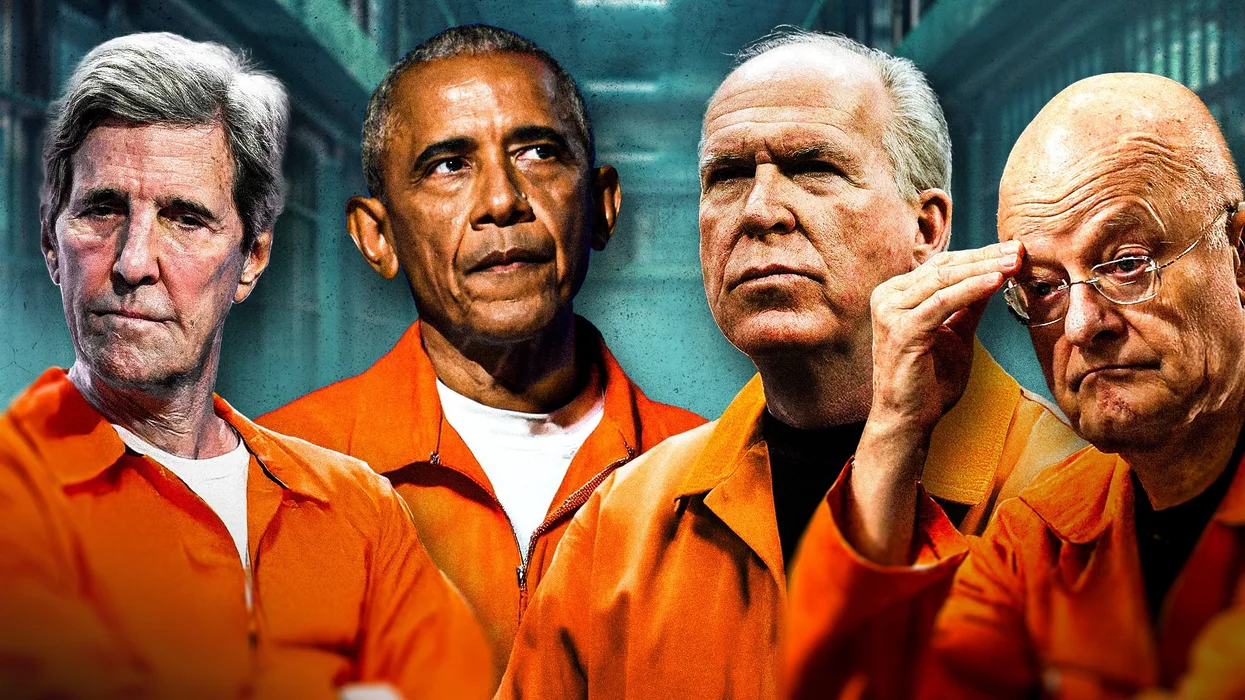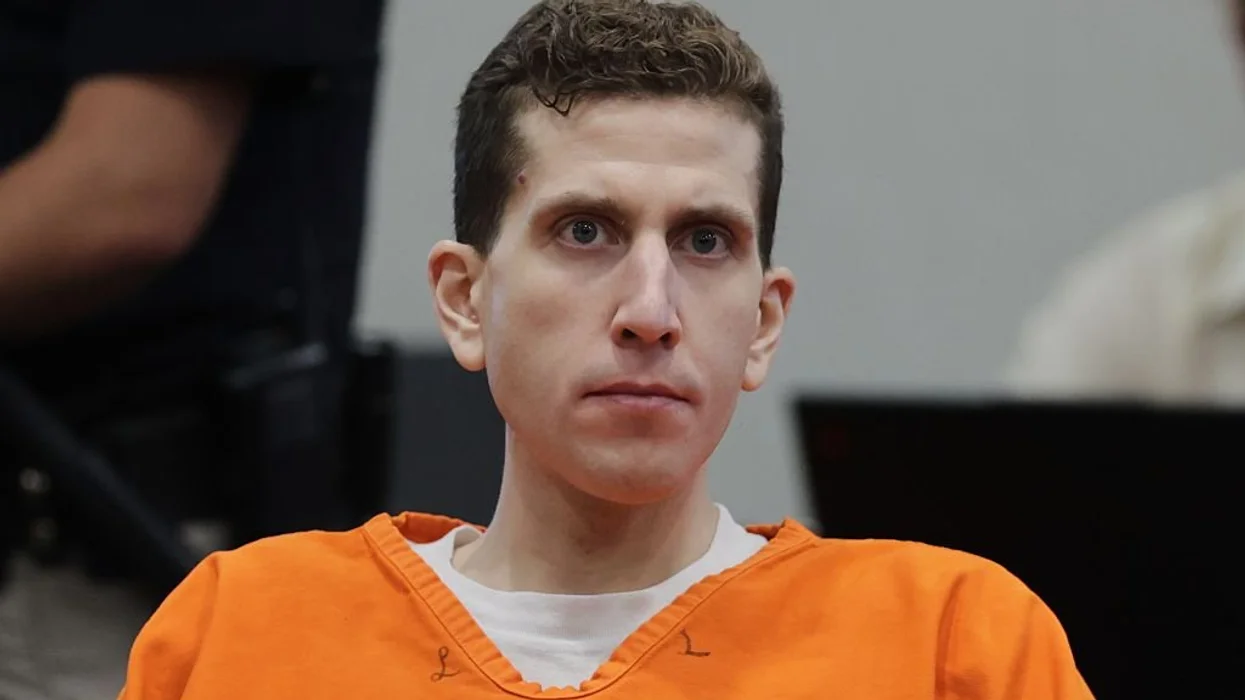 WASHINGTON, DC - FEBRUARY 12: U.S. Vice President Joe Biden (L) applauds as U.S. President Barack Obama gives his State of the Union address during a joint session of Congress at the U.S. Capitol February 12, 2013 in Washington, DC. Facing a divided Congress, Obama focused his speech on new initiatives designed to stimulate the U.S. economy. Credit: Getty Images
WASHINGTON, DC - FEBRUARY 12: U.S. Vice President Joe Biden (L) applauds as U.S. President Barack Obama gives his State of the Union address during a joint session of Congress at the U.S. Capitol February 12, 2013 in Washington, DC. Facing a divided Congress, Obama focused his speech on new initiatives designed to stimulate the U.S. economy. Credit: Getty Images
Promising to create new jobs without increasing the federal deficit, President Barack Obama on Tuesday called for a "smarter government" not a bigger one to help revive a "rising thriving middle class" during his State of the Union address.
In his first State of the Union address since winning re-election, Obama made good on his promise to make climate change more of a priority in his second term and called on Congress to do more to invest in clean energy combat global warming.
"[F]or the sake of our children and our future, we must do more to combat climate change," he said. "Yes, it’s true that no single event makes a trend. But the fact is, the 12 hottest years on record have all come in the last 15. Heat waves, droughts, wildfires, and floods – all are now more frequent and more intense."
"We can choose to believe that Superstorm Sandy, and the most severe drought in decades, and the worst wildfires some states have ever seen were all just a freak coincidence," he continued. "Or we can choose to believe in the overwhelming judgment of science – and act before it’s too late."
If Congress refuses to act "soon," the president said he was prepared to go around lawmakers and act through executive orders to "reduce pollution, repair our communities from the consequences of climate change and speed the transition to more sustainable forms of energy."
Gun control was a key theme in Obama's State of the Union address. He invoked the victims of the Sandy Hook massacre and 15-year-old Hadiya Pendleton to make his case for new gun laws.
"Of course, what I’ve said tonight matters little if we don’t come together to protect our most precious resource – our children," the president said. "It has been two months since Newtown. I know this is not the first time this country has debated how to reduce gun violence. But this time is different. Overwhelming majorities of Americans – Americans who believe in the 2nd Amendment – have come together around commonsense reform – like background checks that will make it harder for criminals to get their hands on a gun."
He invited Hadiya's parents to Tuesday's State of the Union address because "they deserve a vote." He then listed all the tragic shootings that have recently occurred in the U.S.
"Gabby Giffords deserves a vote. The families of Newtown deserve a vote. The families of Aurora deserve a vote. The Families of Oak Creek and Tucson, and Blacksburg and the countless other communities ripped open by gun violence -- they deserve a simple vote."
He admitted that no law or initiative will prevent every "senseless act of violence," however, argued that something had to be done to make a difference.
Obama also called for closing tax loopholes for the "well off and the well connected" to help increase revenue and reduce the deficit. He did reiterate his willingness to tackle entitlement changes, particularly on Medicare, though he has ruled out increasing the eligibility age for the popular benefit program for seniors because the government shouldn't "make promises it can't keep."
Obama called job creation his "North Star" and implored a divided Congress to center its work on attracting more jobs to the U.S., equipping Americans to compete for those positions and making sure hard work leads to a decent living.
"Most Americans…know that broad-based economic growth requires a balanced approach to deficit reduction, with spending cuts and revenue, and with everybody doing their fair share," Obama said. "And that’s the approach I offer tonight."
The commander-in-chief argued that "there is much progress to report," with a decade-long war winding down, the American auto industry rebounding and the housing market healing.
"Together, we have cleared away the rubble of crisis, and can say with renewed confidence that the state of our union is stronger," he added.
The president said his proposals to increase spending on manufacturing, infrastructure and clean-energy technologies would be fully paid for, though he did not specify how he would offset the cost of his proposals.
"Nothing I'm proposing tonight should increase our deficit by a single dime," Obama said. "It's not a bigger government we need, but a smarter government that sets priorities and invests in broad-based growth."
 WASHINGTON, DC - FEBRUARY 12: House Speaker John Boehner (R-OH) (R) listens as U.S. President Barack Obama gives his State of the Union address during a joint session of Congress at the U.S. Capitol February 12, 2013 in Washington, DC. Facing a divided Congress, Obama focused his speech on new initiatives designed to stimulate the U.S. economy. Credit: Getty Images
WASHINGTON, DC - FEBRUARY 12: House Speaker John Boehner (R-OH) (R) listens as U.S. President Barack Obama gives his State of the Union address during a joint session of Congress at the U.S. Capitol February 12, 2013 in Washington, DC. Facing a divided Congress, Obama focused his speech on new initiatives designed to stimulate the U.S. economy. Credit: Getty Images
 WASHINGTON, DC - FEBRUARY 12: U.S. President Barack Obama delivers his State of the Union speech before a joint session of Congress at the U.S. Capitol February 12, 2013 in Washington, DC. Facing a divided Congress, Obama focused his speech on new initiatives designed to stimulate the U.S. economy and said, 'It’s not a bigger government we need, but a smarter government that sets priorities and invests in broad-based growth'. Credit: Getty Images
WASHINGTON, DC - FEBRUARY 12: U.S. President Barack Obama delivers his State of the Union speech before a joint session of Congress at the U.S. Capitol February 12, 2013 in Washington, DC. Facing a divided Congress, Obama focused his speech on new initiatives designed to stimulate the U.S. economy and said, 'It’s not a bigger government we need, but a smarter government that sets priorities and invests in broad-based growth'. Credit: Getty Images
 WASHINGTON, DC - FEBRUARY 12: U.S. President Barack Obama delivers his State of the Union speech before a joint session of Congress at the U.S. Capitol February 12, 2013 in Washington, DC. Facing a divided Congress, Obama focused his speech on new initiatives designed to stimulate the U.S. economy and said, 'It’s not a bigger government we need, but a smarter government that sets priorities and invests in broad-based growth'. Credit: Getty Images
WASHINGTON, DC - FEBRUARY 12: U.S. President Barack Obama delivers his State of the Union speech before a joint session of Congress at the U.S. Capitol February 12, 2013 in Washington, DC. Facing a divided Congress, Obama focused his speech on new initiatives designed to stimulate the U.S. economy and said, 'It’s not a bigger government we need, but a smarter government that sets priorities and invests in broad-based growth'. Credit: Getty Images
 WASHINGTON, DC - FEBRUARY 12: U.S. President Barack Obama delivers his State of the Union speech before a joint session of Congress at the U.S. Capitol February 12, 2013 in Washington, DC. Facing a divided Congress, Obama focused his speech on new initiatives designed to stimulate the U.S. economy and said, 'It’s not a bigger government we need, but a smarter government that sets priorities and invests in broad-based growth'. Credit: Getty Images
WASHINGTON, DC - FEBRUARY 12: U.S. President Barack Obama delivers his State of the Union speech before a joint session of Congress at the U.S. Capitol February 12, 2013 in Washington, DC. Facing a divided Congress, Obama focused his speech on new initiatives designed to stimulate the U.S. economy and said, 'It’s not a bigger government we need, but a smarter government that sets priorities and invests in broad-based growth'. Credit: Getty Images
Just as he did during his first term, Obama pledged to pursue comprehensive immigration reform in his second term. He called for stronger border security, establishing a pathway to citizenship and cutting the red tape for deserving immigrants.
"Our economy is stronger when we harness the talents and ingenuity of striving, hopeful immigrants," he said. "And right now, leaders from the business, labor, law enforcement, and faith communities all agree that the time has come to pass comprehensive immigration reform."
The president implored lawmakers to break through partisan logjams, asserting that "the greatest nation on Earth cannot keep conducting its business by drifting from one manufactured crisis to the next."
"Americans don't expect government to solve every problem," he said. "They do expect us to forge reasonable compromise where we can."
Yet Obama offered few signs of being willing to compromise himself, instead doubling down on his calls to create jobs by spending more government money and insisting that lawmakers pay down the deficit through a combination of targeted spending cuts and tax increases. But he offered few specifics on what he wanted to see cut, focusing instead on the need to protect programs that help the middle class, elderly and poor.
On the economy, Obama called for raising the federal minimum wage from $7.25 to $9 by 2015. The minimum wage has been stagnant since 2007, and administration officials said the increase would strengthen purchasing power. The president also wants Congress to approve automatic increases in the wage to keep pace with inflation.
Education also figures in Obama's plans to boost American competitiveness in the global economy. Under his proposal, the federal government would help states provide pre-school for all 4-year-olds. Officials did not provide a cost for the pre-school programs but said the government would provide financial incentives to help states.
Among the other initiatives Obama is proposing:
- A $1 billion plan to create 15 "manufacturing institutes" that would bring together businesses, universities and the government. If Congress opposes the initiative, Obama plans to use his presidential powers to create three institutes on his own.
- Creation of an "energy security trust" that would use revenue from federal oil and gas leases to support development of clean energy technologies such as biofuels and natural gas
- Doubling of renewable energy in the U.S. from wind, solar and geothermal sources by 2020
The Associated Press contributed to this report.

 WASHINGTON, DC - FEBRUARY 12: U.S. Vice President Joe Biden (L) applauds as U.S. President Barack Obama gives his State of the Union address during a joint session of Congress at the U.S. Capitol February 12, 2013 in Washington, DC. Facing a divided Congress, Obama focused his speech on new initiatives designed to stimulate the U.S. economy. Credit: Getty Images
WASHINGTON, DC - FEBRUARY 12: U.S. Vice President Joe Biden (L) applauds as U.S. President Barack Obama gives his State of the Union address during a joint session of Congress at the U.S. Capitol February 12, 2013 in Washington, DC. Facing a divided Congress, Obama focused his speech on new initiatives designed to stimulate the U.S. economy. Credit: Getty Images





